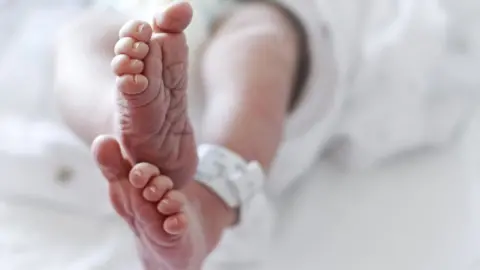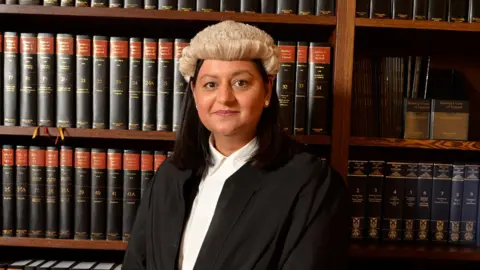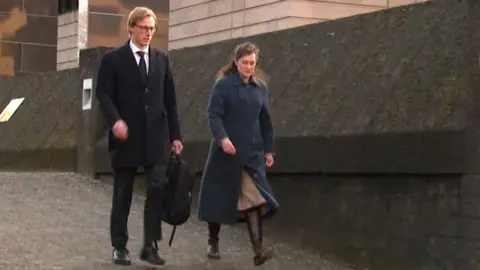Why parents are reliving their baby-loss nightmares
 Getty Images
Getty ImagesA fatal accident inquiry (FAI) got under way this week into the deaths of three babies, all less than a day old, in Lanarkshire.
The death of a baby is an event no parent should endure, let alone in circumstances where - if there were different decisions, procedures, or knowledge - that baby may have survived.
To then have the details of that personal tragedy made public is further trauma that no family would want.
Mirabelle Bosch died at just 12 hours old on 2 July 2021 at Wishaw General Hospital.
Ellie McCormick died at five hours old on 5 March 2019 at the same hospital.
And Leo Lamont was two hours old when he died at Monklands Hospital on 15 February 2019.
It is important that these deaths are not brushed off as isolated tragedies, and if there are common failings then they should be investigated to prevent anything like this from happening again.
That is why three families who were anticipating a joyous turn in their lives are putting themselves through the distress of reliving their worst nightmare.
What is an FAI and why has it been called for?
This FAI was called by the Crown Office and Procurator Fiscal Service which has deemed it in the public interest for this inquiry to take place.
Mirabelle, Leo and Ellie were all said to have died "in circumstances giving rise to serious public concern".
The purpose of this FAI is not to apportion blame, but to establish what happened and prevent future deaths from happening in similar circumstances.
A sheriff will hear evidence, and eventually issue a determination of their findings which can include recommendations.
 Spindrift
SpindriftWhat have we learned so far?
Sheriff Principle Aisha Anwar, who is leading this inquiry, is sensitive to the immense trauma suffered by each family.
While there is no way to avoid the distressing detail of what happened, much of their evidence has been submitted as written affidavits to save them the ordeal of being questioned on it in court.
All the parents were in court on the first day of the inquiry, but none have been there since.
Although very little is known at this stage, it is clear that a key question families want answered is how and whether potential procedural or system errors contributed to their babies deaths.
The inquiry is set out in three chapters, firstly looking at the circumstances around Mirabelle Bosch's death. Her father Eckhardt, told the inquiry they were "led into a dark tunnel" by "misguided" instructions which gave them a "wrong sense of security".
They had believed everything with the pregnancy was normal, with antenatal checks suggesting the baby was healthy and developing as it should.
But the court heard that despite a 31-week scan recording the baby as completely breech, three subsequent midwife examinations recorded it as being in a head down, cephalic position. This is the position that typically allows for the smoothest delivery.
Even when Rozelle Bosch's waters broke suddenly on 30 June 2021 and she was examined in hospital, the midwife sent her home to wait for labour to advance.

Mirabelle was considered a "low-risk" pregnancy and midwife Michelle Tannahill told the inquiry this week she saw "no red flags" upon her examination.
"Everything I had found that night was within the scope of my practice within midwifery. There wasn't anything concerning," she said.
The details of what happened next are extremely distressing.
Husband Eckhardt Bosch said he still feels the trauma in his body over the night of 1 July.
After going into active labour at home, paramedics were called but a catalogue of delays ensued.
It took five attempts to call the maternity unit at Wishaw General Hospital before anybody answered the phone, and paramedics were unable to deliver the baby themselves.
Mirabelle's head was stuck and by the time mother and baby were taken to hospital, her chances of survival were very slim.
She died hours later in her mother's arms.
The post-mortem later noted that if the breech position had been recognised earlier in the pregnancy, then Rozelle would have likely been classified as a higher risk where a management plan for a hospital birth would have been arranged and the outcome may have been different.
The pathologist also concluded if there had not been such a long delays transporting the patient to hospital, she may also have stood a chance of survival.
What has still to come?
Evidence has been heard from health professionals involved in Mirabelle's death, with expert witnesses who were not directly involved in the case to follow. The FAI will then examine the deaths of Ellie McCormick and Leo Lamont.
At this point there is no indication that health professionals in Mirabelle's case had not followed the protocols or procedures in place at the time.
However, there have been questions about whether software used to record details of the pregnancy may not have alerted those involved of potential risks, or may have some limitations in the information it can hold.
Issues around the subjectivity of deciding whether a baby is engaged in early pregnancy, and how clear instructions are to mothers on when they come into hospital, have also been discussed.
These areas are likely to be explored further when the inquiry examines the circumstances around the deaths of Leo and Ellie.
Speaking to BBC Scotland News, the McCormick family lawyer said they believe Ellie's death was entirely avoidable.

Darren Deery, a specialist in medical negligence law, said: "The family's understanding is that there were potential defects in the system, in that certain risk factors weren't highlighted in the way they could, and should, have been.
"And had the subsequent midwifery and obstetrics staff been aware of those risks, a different course of action would have been taken and the outcome may well have been different."
Ultimately there will be no blame placed here, but it will look in detail at what happened in each case, considering whether systems were at fault, whether individual or collective errors were involved and it will establish what steps, if any, might be taken to prevent other children dying in similar circumstances.
